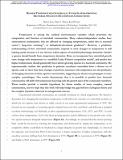Higher temperatures generically favour slower-growing bacterial species in multispecies communities
Author(s)
Lax, Simon; Abreu, Clare Isabel; Gore, Jeff
DownloadSubmitted version (1.083Mb)
Publisher Policy
Publisher Policy
Article is made available in accordance with the publisher's policy and may be subject to US copyright law. Please refer to the publisher's site for terms of use.
Terms of use
Metadata
Show full item recordAbstract
Temperature is one of the fundamental environmental variables that determine the composition and function of microbial communities. However, a predictive understanding of how microbial communities respond to changes in temperature is lacking, partly because it is not obvious which aspects of microbial physiology determine whether a species could benefit from a change in the temperature. Here we incorporate how microbial growth rates change with temperature into a modified Lotka–Volterra competition model and predict that higher temperatures should—in general—favour the slower-growing species in a bacterial community. We experimentally confirm this prediction in pairwise cocultures assembled from a diverse set of species and show that these changes to pairwise outcomes with temperature are also predictive of changing outcomes in three-species communities, suggesting that our theory may be applicable to more-complex assemblages. Our results demonstrate that it is possible to predict how bacterial communities will shift with temperature knowing only the growth rates of the community members. These results provide a testable hypothesis for future studies of more-complex natural communities and we hope that this work will help to bridge the gap between ecological theory and the complex dynamics observed in metagenomic surveys.
Date issued
2020-03Department
Massachusetts Institute of Technology. Department of PhysicsJournal
Nature Ecology and Evolution
Publisher
Springer Science and Business Media LLC
Citation
Lax, Simon et al. "Higher temperatures generically favour slower-growing bacterial species in multispecies communities." Nature Ecology and Evolution 4, 4 (March 2020): 560–567 © 2020 The Author(s)
Version: Original manuscript
ISSN
2397-334X